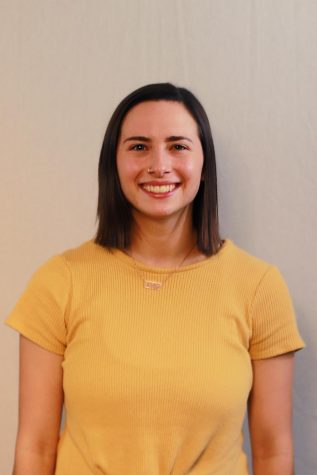Active Minds brings attention to eating disorders during National Eating Disorders Awareness Week
March 4, 2020
On Feb. 27, Active Minds hosted Licensed Professional Counselor Jamie Mershon and her friend Lauren Walls, who has struggled with an eating disorder, to speak about eating disorders. The event followed the National Eating Disorders Association’s (NEDA) “Come as You Are” theme for this year’s National Eating Disorders Awareness Week, Feb. 24-March 1.
To open up the conversation, Mershon explained how eating disorders are a symptom of larger problems in an affected person’s life.
“When I think about an eating disorder, oftentimes, it’s a coping mechanism … it can be because there’s trauma, and it doesn’t always have to be trauma. It can be because we don’t have the proper coping mechanisms or the proper coping skills,” Mershon said.
When Mershon works with a client with an eating disorder, she pursues the cause behind the eating disorder rather than treating only the client’s eating habits.
“When you look at an eating disorder, you’re not just like, like ‘Hey, how can we get you to stop throwing up? How can we get you to stop starving yourself?’ It is ‘How can we heal you from whatever you’re coping from?’” Mershon said.
Walls shared how her eating disorder allowed her to cope with her childhood of abuse and poverty.
“What my eating disorder did for me was it provided some sense of control,” Walls said. “I could control what I could put in my body. I could not control anything else around me. I couldn’t control who was touching me or what was happening, but I could control what I was eating.”
Mershon explained how starvation affects the brain and leads to further problems.
“Your brain accounts for only 2% of your body’s weight, yet it uses 20-30% of the calories you consume and 20% of the oxygen and blood in your body, so chronic starvation means … your brain isn’t [getting] the calories it needs to function optimally. So what does that mean? You’re more at risk for depression. You’re not thinking clearly. You get dysregulated easily. So when you think of, like, an eating disorder, it’s not just isolated to an eating disorder,” Mershon said.
According to Mershon, aside from idealizing certain body types through social media, society perpetuates the myth that people with eating disorders look a certain way or have all experienced trauma.
“Eating disorders do not discriminate, right? So we kind of have this idea of who it happens to or what it looks like and, you know, just from being a counselor, all walks of life come in with eating disorders,” Mershon said.
To oppose the stigma surrounding eating disorders, Mershon said people must speak openly about their struggles.
“Untold stories don’t heal. So, number one, we have to be authentic and we have to talk about life,” Mershon said.
Walls shared where she is in her recovery process.
“It’s not like, all of a sudden, where I arrive and it’s like ‘Okay, I don’t struggle anymore,’” Walls said. “I very well have my hard days, and it’s a process … just recognizing that there will be struggle, but that we’re not living out of a place of defeat.”
She gave advice to friends of those with eating disorders based on what helped her choose recovery.
“I think the process of healing can feel very overwhelming, and you don’t know where to start, but if you come—if somebody comes to you and says, ‘I have an eating disorder,’ you can say ‘You know what? You don’t have to do this alone. Let’s sit down together. Let’s make some phone calls to these counselors,’” Walls said.
Walls shared her story in hopes that others would relate and see that recovery from an eating disorder is possible.
“There is hope on the other side of an eating disorder. There’s hope for freedom,” Walls said.
NEDA’s Helpline is available Monday through Thursday from 8 a.m. to 8 p.m. Central Standard Time (CST) and Friday from 8 a.m. to 4 p.m. CST.









